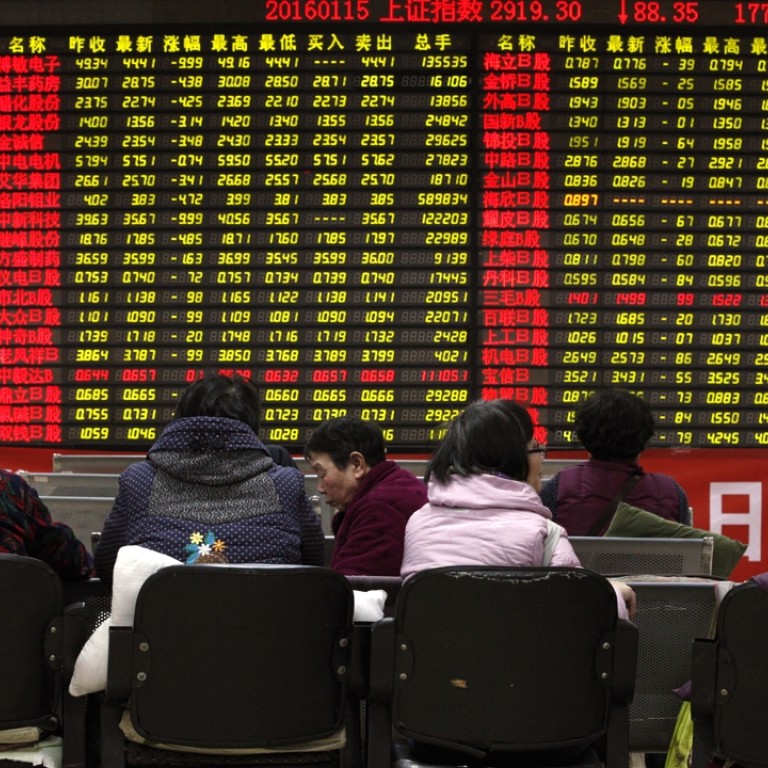
‘National team’ takes a back seat as mainland China market turmoil drags on
One strategy that is gaining traction is to stop people selling
Once such a fixture in mainland China’s stock markets that investors scrutinised exchange filings for its footprints in the hope of gaining a trading edge, the so called “national team” appears to have taken a back seat in recent months.
Brokers who follow trading patterns on the mainland say that the national team – a moniker for state-sanctioned equities buying by Chinese financial institutions to support trading levels – has mostly stopped buying as benchmark indices fall to new 14-month lows.
Ivan Li, an equities analyst at Tung Shing Securities in Hong Kong, says the government is instead focusing on the yuan exchange rate as “they realise this is the source of uncertainty” given swings in a country’s currency have a greater impact on an economy that a concurrent movement in the stock market.
The term “national team” was popularised last summer when mainland Chinese markets went into a tail spin prompting regulators to require major investors hold the line. Fund managers and company directors at major firms were told to buy more stocks, short selling was restricted, and a probe into insider trading was launched, netting dozens of senior financial sector executives.
Where before it was a written statement, now it is a phone call saying ‘you are not going to sell your shares are you?’
Analysts at the time tried to guess what index levels the national team would focus on supporting. Writing last July, BNP Paribas’s Judy Zhang was among several analysts to suggest 3,500 points on the Shanghai Composite as a trigger level for regulatory intervention. As it happened, the index spent most of the second half of the year trading in the 3,300 to 3,500 point range, only to fall below 3,000 points in the first two weeks of this year.
Xingtai Capital chief executive and Chinese stock investor Michelle Leung says regulators will still try to support the markets. “A lot of retail investors are looking at [the 3,000 level on the Shanghai Composite Index] as psychological support,” she said.
One of the central bank’s main goals is to keep liquidity in the market, which it was doing, said China Construction Bank International analyst Mark Jolley. The government wanted to keep the Shanghai Composite above the 3,000-point level, Jolley said, and was using “moral suasion” to encourage fund managers to keep buying.
The Shanghai Composite closed at 2,900.97 points on Friday, its lowest close since November 2014.
Others are less sure the government has a specific target in mind. “The shit is starting to hit the fan and they don’t know how to respond,” said Fraser Howie, a long-time China market watcher and author of Red Capitalism.
Howie said national team buying “has morphed” and is “much lower key” with occasional purchases being made via mutual funds where transactions were headlined less prominently.
Goldman Sachs estimated that two of the biggest players, the China Securities Finance Corporation, a state-controlled lender, and sovereign wealth group Central Huijin Investment, spent a combined 1.8 trillion yuan (HK$2.12 trillion) between June and November last year buying shares to support the markets.
These holdings included multi-billion-yuan stakes in various mainland banks, exchange filings showed last summer, while other state-sanctioned investors bought into a broad range of large- and mid-cap stocks.
Those stakes are likely under water.
One strategy that is gaining traction is to stop people selling. In the past fortnight more than 70 mainland Chinese companies announced their biggest shareholders would not be selling stock after mainland regulators placed restrictions on holders of shares acquired in the primary market, limiting them to offloading stakes equivalent to 1 per cent of a company’s total share capital every three months.
“Where before it was a written statement, now it is a phone call saying ‘you are not going to sell your shares are you?’,” Howie said.

